
|
Johannes Noviomagus, Albrecht Dürer |
CL Ptolomaei ... Phaenomena stellarum MXXII. fixarum ad hanc aetatem reducta, atque seorsum in studiosorum gratiam : adiecta est Isagoge Ioannis Noviomagi ad stellarum inerrantium longitudines ac latitudines, cui etiam accessere imagines sphaerae barbaricae duodequinquaginta. Alberti Dureri / nunc primum edita, interprete Georgio Trapezuntio, Excusum Coloniae Agrippinae, 1537 |
Johannes Noviomagus, Albrecht Dürer
CL Ptolomaei ... Phaenomena stellarum MXXII. fixarum ad hanc aetatem reducta, atque seorsum in studiosorum gratiam : adiecta est Isagoge Ioannis Noviomagi ad stellarum inerrantium longitudines ac latitudines, cui etiam accessere imagines sphaerae barbaricae duodequinquaginta. Alberti Dureri / nunc primum edita, interprete Georgio Trapezuntio, Excusum Coloniae Agrippinae, 1537
Il
titolo
dell’edizione del catalogo di Tolomeo curata nel 1537 da J. Noviomagus
riporta con evidenza che al testo sono allegate immagines
sphaerae barbaricae duodequinquaginta di Albrecht Dürer. Nelle copie del libro depositate presso le biblioteche di quasi tutto il mondo queste
tavole però non esistono e già nel
Si era anche arrivati al punto di dubitare della loro esistenza quando finalmente
due incisioni furono ritrovate in una copia
del libro di Noviomagus appartenente alla Middle Temple Library di Londra.
La scoperta è di Renae Satterley che ne ha
fatto oggetto di studio nel suo saggio: The
Rediscovery of two Celestial Maps from 1537, apparso in Imago
Mundi 62/1 (2010).
Della tavola del cielo meridionale si è addirittura ritrovata una copia manoscritta a Nürnberg presso il Germanisches Nationalmuseum: Graphische Sammlung, Inventar-Nr. HB 27108, Kapsel-Nr. 1206, manoscritto che doveva essere servito come modello per una delle due incisioni del 1537. In questa scheda lo riproduco insieme alla copertina del testo di Noviomagus.

http://www.bildindex.de/?+pgesamt:Noviomagus#|home
Il
testo in tedesco che segue è invece tratto dalla pagina

https://www.astronomie-nuernberg.de/index.php?category=duerer&page=ptolemaeus-1537
https://www.astronomie-nuernberg.de/index.php?category=duerer&page=sternkarten
https://www.astronomie-nuernberg.de/index.php?category=duerer&page=nachfolger
Himmelskarten
von 1537, beigebunden dem Sternkatalog von Ptolemäus 1537
gab
Noviomagus (= Jan Bronkhorst (1494-1570)) in Köln den Sternkatalog des
Ptolemäus heraus, dem laut Untertitel die 48 Sternbilder Dürers beigebunden
waren. Diese
fehlen jedoch in den meisten bekannten Exemplaren, insbesondere denen online.
Das ging soweit, dass man bezweifelte, dass sie je gedruckt wurden. Im November
2008 entdeckte sie jedoch Renae Satterley in den Beständen der Middle Temple
Library in London und publizierte darüber
Abweichungen
und zusätzliche Informationen:
Auf
der Karte des Nordhimmels wurde nur die Überschrift und die Schriftart geändert.
Die
Kartuschen am Südhimmel sind geändert.
Die
Sterne sind wieder in sechs Größenklassen eingeteilt.
In
der rechten unteren Ecke ist findet sich nach wie vor das Porträt von As-Sufi,
er wird jedoch als THALES MLI (=Milesius?) bezeichnet. Das verwundert insofern,
als Thales ein bekannter Mathematiker, aber kein Astronom war.
Die
auf der Dürer-Karte vom Sternkatalog von Ptolemäus abweichende Nummerierung in
den Sternbildern Andromeda und Argo wurde korrigiert.
Phantomsterne
der Dürerkarte in Auriga, Andromeda und Argo wurden beseitigt. Stattdessen
finden sich neue Phantomsterne in Gemini (Zwillinge), Orion, Piscis Austrinus (Südlicher
Fisch) sowie an der Grenze zwischen Auriga und Taurus.
Aufbewahrende
Institution:
Bayerische
Staatsbibliothek, München: 2° A gr.b 1003 h (Katalog ohne Karten)
Middle
Temple Library, London: L (ELF)
Germanisches
Nationalmusuem, Nürnberg: Inv.Nr. HB 27108 Kapsel 1206
Literatur:
Dekker,
Elly; Meurer, Peter H.; Satterley, Renae: Zwei Himmelskarten nach Dürer bei
Johannes Noviomagus (Köln 1537). In: Cartographica Helvetica 42 (2010), S.
39-53
Satterley,
Renae: The Rediscovery of two Celestial Maps from 1537. In: Imago Mundi 62/1
(2010), S. 86-92 (mit Abbildung der Sternkarten)
La seguente sintesi che si occupa degli stessi documenti iconografici è invece relativa al testo di
Elly Dekker, Peter H. Meurer e Renae Satterley:
Two celestial maps according to Albrecht Dürer by Joannes Noviomagus, Cologne 1537
apparso
in Cartographica Helvetica, 42 nel 2010:
From
1532 to 1541, Johannes Noviomagus (c. 1509–1569) was a Latin teacher at
the Gymnasium Montanum, which is a part of the Faculty of Arts at the University
of Cologne. Among his many publications was a new edition (Cologne 1537) of the
star catalogue of Ptolemy’s Almagest. The edition complies with the Latin
translation by George Trapezuntius, but with newly computed stellar coordinates.
The book title mentions the addition of illustrations showing 48 stellar
constellations. However, two generations of bibliographers have been unable to
trace a copy in which the illustrations are included. Only recently a complete
copy has come to light at the Middle Temple Library in London.
The illustration consists of two woodcut maps of the northern and southern celestial hemispheres which are very similar to the two stellar maps by Albrecht Dürer from 1515. The woodcut work can be attributed to the famous Cologne artist Anton Woensam (1492/1500–1541); one of the preparatory sketches which is probably from his hand also exists. A detailed astronomical analysis of the two Cologne maps reveals many additions and corrections compared to Dürer's models. These adjustments are linked to the early work of the Cologne cartographer and instrumentmaker Caspar Vopelius (1511–1561). But many errors in revision and design suggest that the compilation was done by Noviomagus himself. Moreover, the two maps do not really match with Noviomagus' edition of the Almagest. In addition, the dedication to the influential dean Reinhard von Westerburg-Leiningen from Cologne contains a few typographical errors. The sum of these mistakes may explain why most copies of the book were brought onto the market without the maps.
TITOLO e alcune pagine
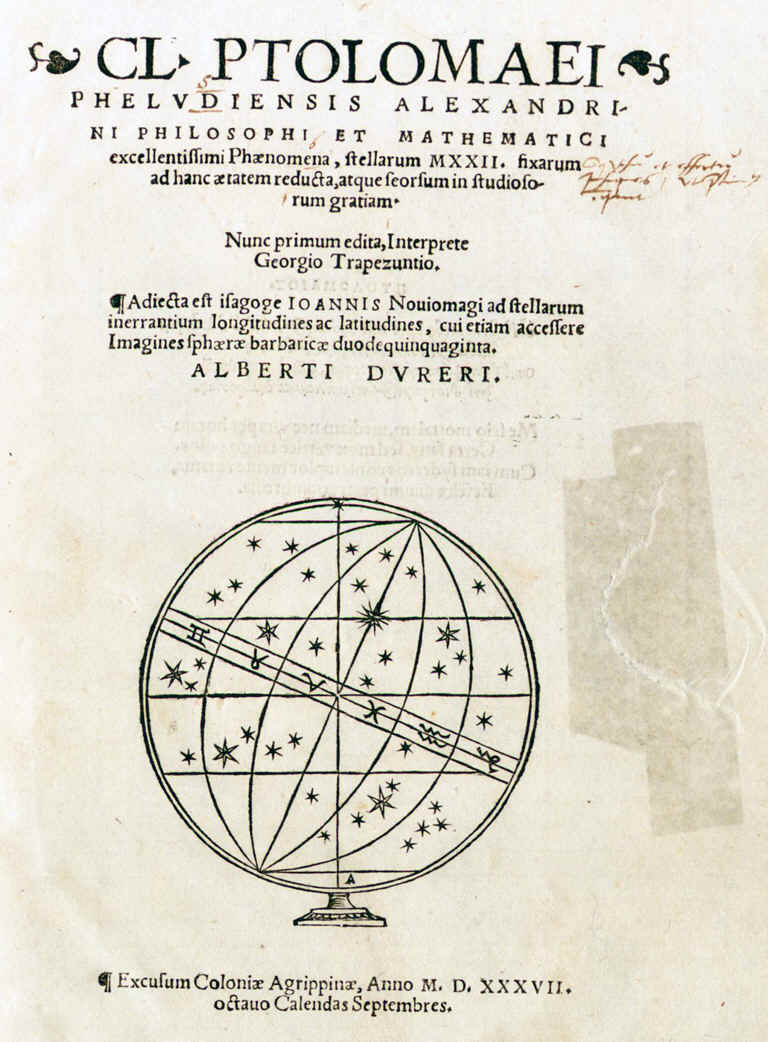
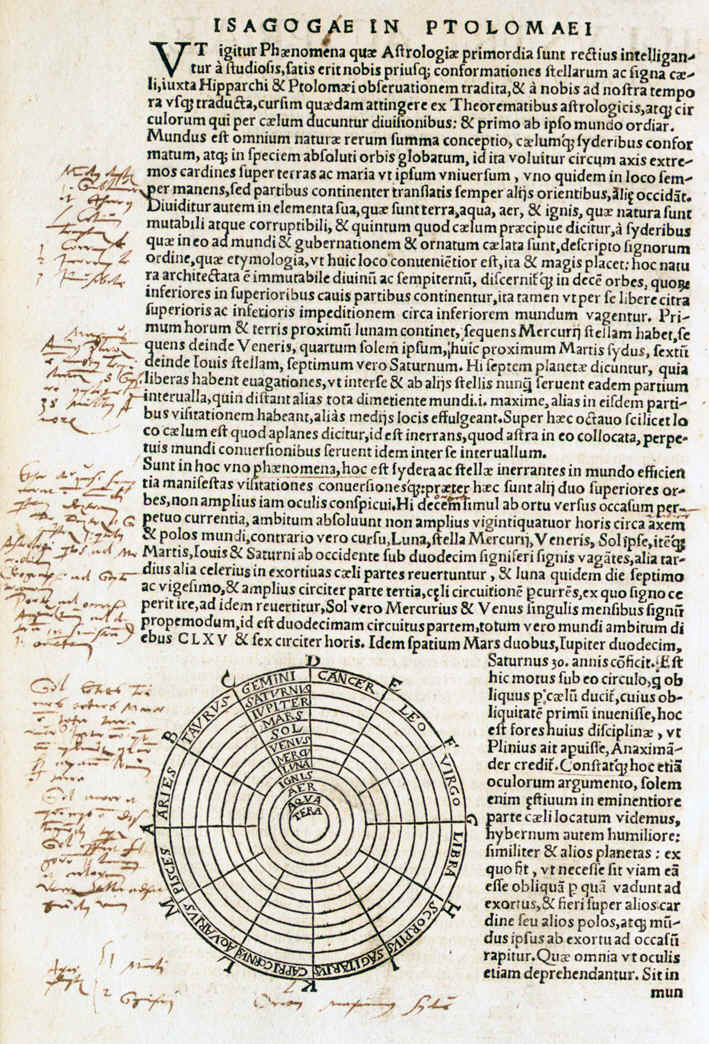
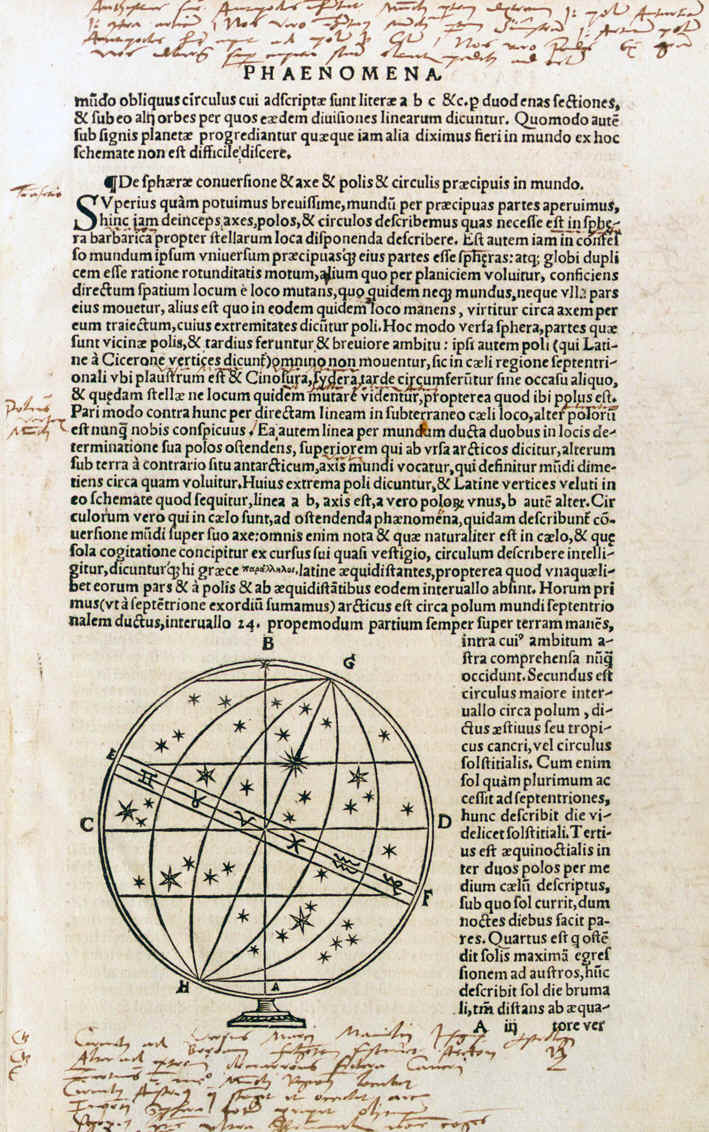
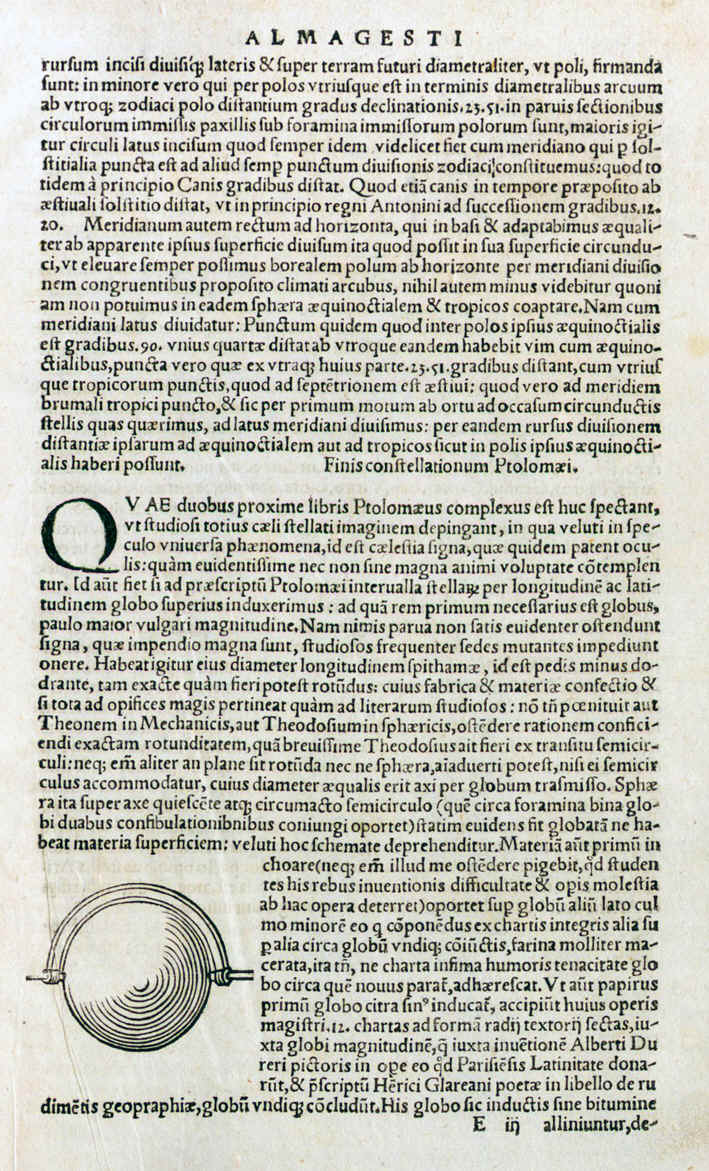
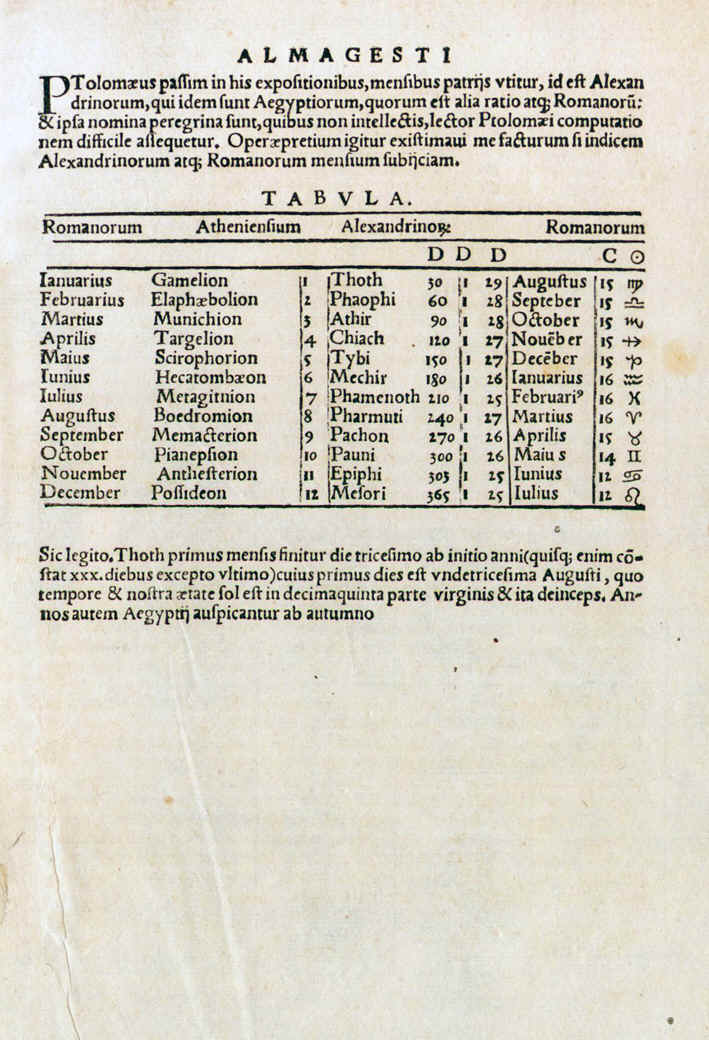
TAVOLA
Der
südliche Sternenhimmel mit seinen Sternbildern
Johannes
Noviomagus Stecher
Namensvarianten:
Neomagus von Brunchorst
Stecher
& Philosoph
Professor
geboren:
1542, Bronchorst
gestorben:
1570, Köln
tätig
in Deventer & Köln & Nimwegen
Schaffenszeit:
1542-
Literatur:
DBA, Fiche 905, 399
Sternkarte,
Einblattdruck, Reproduktionsgraphik
Tinte
(braun), Papier, handgeschrieben & Kielfeder
45,4
x
Nürnberg,
Germanisches Nationalmuseum, Graphische Sammlung, Inventar-Nr. HB 27108,
Kapsel-Nr. 1206
Sprache:
lateinisch
Nachstich
von: Dürer, Albrecht, Druck
Germanisches
Nationalmuseum Nürnberg,
Aufnahme-Nr. HB 27108/1206; Microfiche-Scan mi08030g12;; Aufn.-Datum: 1986
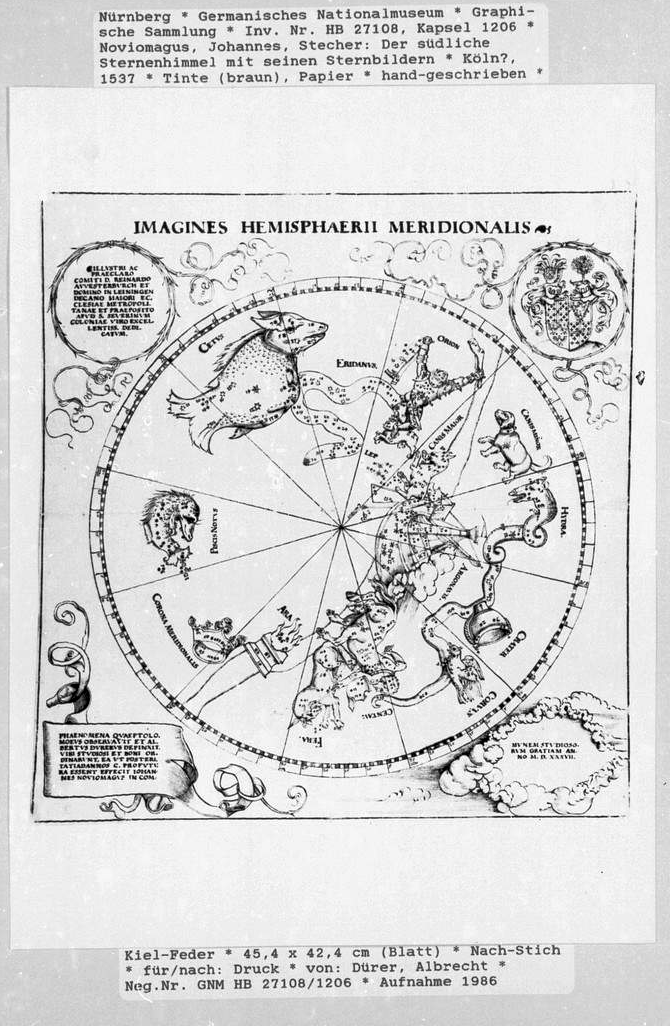
Confronta il manoscritto con la versione xilografica del 1527 e con la xilografia originale del 1515


Manoscritto del 1537 Xilografia del 1527

Xilografia del 1515
http://www.atlascoelestis.com/durer.htm
di FELICE STOPPA
GIUGNO 2014